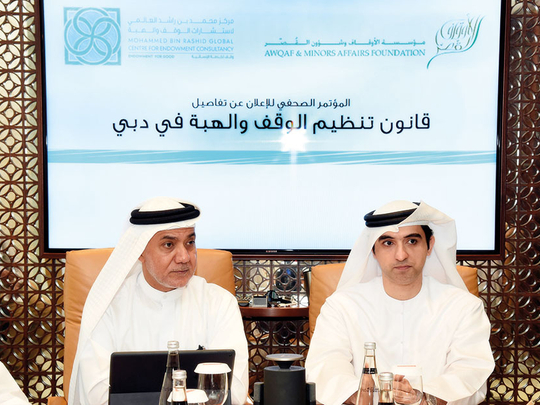
Dubai: Individuals and establishments can now set up their own waqf (endowment or trust fund) under the new Endowment Law, officials said on Sunday.
The law was approved last month by His Highness Shaikh Mohammad Bin Rashid Al Maktoum, Vice-President and Prime Minister of the UAE and Ruler of Dubai.
On Sunday, officials from Awqaf and Minors Affairs Foundation (AMAF) and Mohammad Bin Rashid Global Centre for Endowment Consultancy (MBRGCEC) hosted a joint press conference at the Executive Office to discuss key features of the new law.
In a major new development, private persons, companies and organisations will be allowed to establish their own endowments, be it for education, health, culture, environment, arts or sports, among other sectors, said officials.
Until now, the general practice has seen the contribution of funds to AMAF to support endowment projects managed completely by AMAF, which is the regulator of endowments in Dubai.
AMAF currently manages a total of more than Dh2.7 billion in assets, which include endowments.
As per the new law, AMAF is mandated to receive all necessary documentation from endowment bodies that wish to formally register themselves as such.
AMAF will carry out a careful review of the documentation and issue waqf licenses to the applicants within 10 working days and submit the licences to MBRGCEC.
Endowment Sign
The MBRGCEC will issue a Dubai Endowment Sign to the concerned bodies, enabling them to operate as full-fledged endowment institutions and carry out their humanitarian, cultural, scientific and developmental agendas.
Tayyeb Al Rais, secretary general of AMAF, said: “The new Endowment Law [Law No. 14 of 2017] that has come into force is a call to action and inspiration for individuals and institutions, paving the way for a new phase of development in the UAE society.”
He added: “The Endowment Law has special directives for the establishment of endowment institutions. Licensed by AMAF, these institutions will enjoy independence in the management of their financial affairs within the framework of the licensing rules and regulations as well as the prevailing governance system of endowment institutions. AMAF will monitor these institutions to ensure they achieve their goals and remain committed to this law and preceding laws pertaining to endowments.”
Al Rais said AMAF, as a regulator, will monitor the revenue and expenditure of endowments, ensuring the money is spent according to the declared and agreed upon purpose of the endowment, which could be a school or medical facility, for example.
The purpose and nature of the endowment can be legally changed over time after following the procedures for it and fulfilling the requirements, he pointed out.
“What can happen, eventually, is that these endowment ideas, if you let them go without any regulation, start diversifying and getting into dark alleys, and we want to avoid that,” Al Rais added.
Special privileges
Dr Hamad Al Hammadi, secretary general of MBRGCEC, said that the law will enhance the role of MBRGCEC in granting the Dubai Endowment Sign to institutions that are engaged in community work based on the concept of waqf. He said the law mandates that institutions that hold the Dubai Endowment Sign will be granted special privileges in aspects such as government procurements, setting up and selecting contracts.
Al Hammadi invited entrepreneurs to secure a licence for their respective waqf institutions in order to implement community programmes in various fields. Persons and institutions are free to establish an endowment of their choice, Al Hammadi said, with MBRGCEC providing and information advice on the sectors. He pointed out that, in general, the social needs can be served most by linking them with the UAE Vision 2021 National Agenda.








